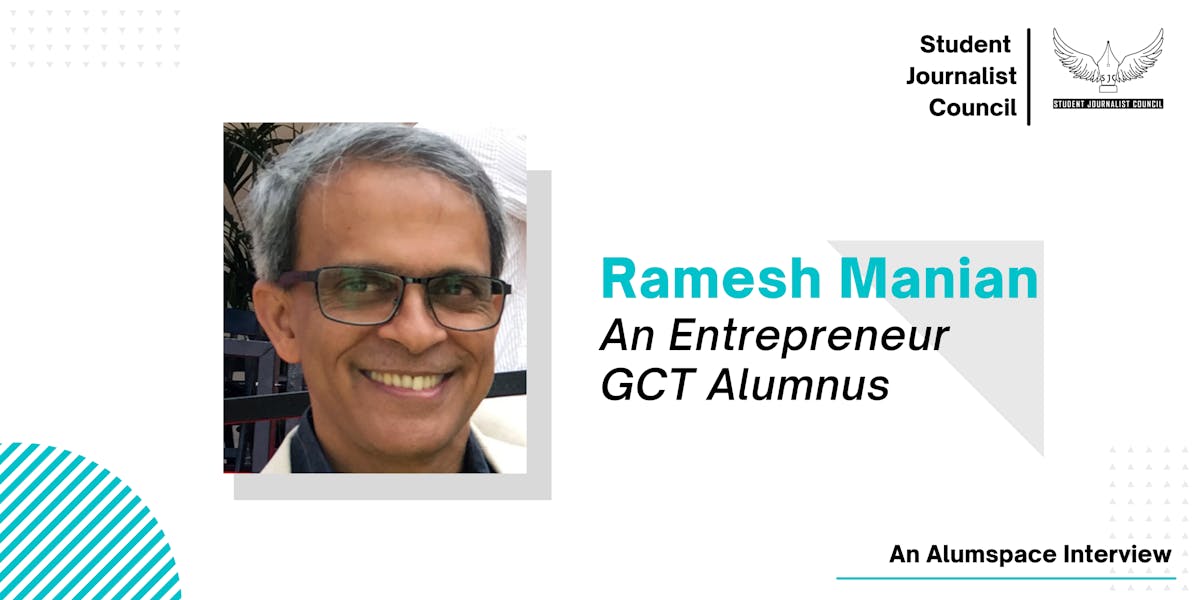
Author
Reporter's Desk 2021-22
Reporter's Desk 2021-22

Ever wondered what a multi-potentialite looks like? Ramesh Manian, (Batch of 1980-84), an Entrepreneur, Engineer, and Executive, talks about different walks of his life, his interests, and what really keeps him going.
“Even as a kid, I was always interested in science. There was this 70-year-old gentleman in our neighborhood, a meteorologist. He would take me on walks with him and he'd talk about climate and the science behind it. All that got me interested in science very early in my life. I used to go to a nearby electronic radio repair shop and learned how to make battery eliminator and other small tools. Back then, I wasn't very keen on taking up engineering; I really wanted to learn physics. When I got selected for admission to GCT for engineering, I accepted it due to my middle-class mindset of wanting to become an engineer or a doctor. It was also nearby and cheap”, says Ramesh Manian when asked about his early life.
As someone who is so into science, did you try innovating something during your stint at GCT?
In your third year, my classmate, Bhaskar Ananthabhotla, and I came up with the idea of making a robot. At that time, we hadn’t heard of anyone making a robot in India. We were stoked. The system design, circuit design, fabrication - everything was done by us, even making the printed circuit board. We bought the motors and necessary electronic components from the market. It took us over a year, and it cost us a lot of money, much of which we raised from local industrialists. The robot, aka MICORA, was a success and we were recognized state-wide as the best project. The whole process was truly an education and that gave a lot of self-confidence. When I came back to GCT in 1990 to give a guest lecture on computer networking, MICORA was displayed prominently in the ECE building. I was told that several students had done projects studying MICORA. Learning that made me happy and felt useful.
What do you think is something that would not have been possible without GCT?
The first thing that comes to my mind is people.
I owe my interest in computer science to my classmate K. Sridhar. He was this wunderkind; he seemed to do everything from first principles. He understood everything at a deep level. When he was asked to set up our first computer, a Pragati 8-bit PC, he let me tag along with him and I learned what an OS is. He showed me how to “peek” and “poke” into the OS. That was a lot of fun. I could make a machine to do what I wanted. He taught me how to recover an erased file from the computer. It was sheer magic!
Our robot project was time-consuming. I had to skip classes, which I was only too happy to do, and was given accommodation for that. We also needed extended use of the facilities, like the workshop and ECE lab, late into the night. When we asked our faculty for help, they gave us free use of any of the facilities and many of the materials we needed. Dr. Samuel, who was the principal, saw this project as innovative and very generously offered to be our project advisor, and we accepted with glee. It took more than just the faculty and lab/workshop staff; several of our friends pitched in to help solve critical problems we faced. Felt like the whole institution was behind us.
Another instance: during my last semester, I had to turn in 8 or so assignments for my workshop course. I didn’t complete a few of them, mainly because I was busy working on the robot and I failed in the course. I was disappointed, because I spent a lot of time in the workshop, and I had learned a ton. Dr. Sarukesi, who was one of the project advisors, heard about this and was quite unhappy. He convinced the workshop teacher that all the missing assignments were well represented in my project and therefore, I should not be penalized for not turning the assignments in. At that moment, GCT felt like a true educational institution and not just a machinery to turn out stamped engineers, though were it not for the reform minded Dr. Sarukesi, I would certainly have had to wait to graduate.
Lastly, my classmates at GCT, many of whom run successful ventures, got me interested in entrepreneurship. I feel Coimbatore is a bit like Silicon Valley in its mindset. There is this audacity in its dwellers, which I hope to always carry in my heart.
You were part of several start-ups and big companies. In general, we get into so many dilemmas when we have to make a choice. How did you come to the conviction to go and switch your career or get into a start-up? What drives you?
I guess the first step is to question yourself. When you are courageous enough to ask yourself tough questions and not lie to yourself when you answer them, you will get to know what it is that you really want to do. For instance, around the turn of the century, I became convinced that AI was going to play a big role in determining what content we consume, and I felt that I needed to show how that can be done. I knew that I didn’t know how to make that happen. I found a few smart people who understood my vision and they were willing to work with me make this idea come alive; that convinced me to go forward. It was not a successful venture financially. It is something I am very thankful for. The experience taught me a lot.
Begin with an end in mind. Visualize your future doing that and ask the hard questions that will get you clarity in terms of how to get to the end. After that, if you feel it is something that you would enjoy doing, then go for it.
What would be your advice to students who want to start up during college but are hesitant due to various factors?
Be clear of what you want to do. Be concrete about it. It doesn't matter if the idea is not earth shaking; what matters is whether you have clarity in your head about the product. When you have that, you have a much better shot at executing the idea.
Ensure that it makes you happy because you'll be spending a long time working on it. So, don’t do it because someone else asked you or others did something similar and was successful. Do it because you have thought it through, and that you think it is worthwhile spending your time. Value your time. If you don’t, no one else will.
We actually missed the most important part. Your passion for cooking and your Italian café - Tell us how that happened.
“Around 2006, I became interested in cooking, the art and science of it. I used to cook multi-course meals for my wife daily. I wanted to learn to do it in a professional setting. I don’t know why I wanted that because I never really envisioned myself being a chef. My guess is that I wanted to be good at it and in a narrow sense, for me it meant being a professional. I asked the chef of a nearby Italian restaurant whether he would teach me. He said yes. I learned for about 6 months and one day out of the blue he said: “25 people are coming for dinner tonight and you have to cook”. I did and it turned out OK. A few months later, he asked if I would invest in a restaurant with him. It started as an investment, but soon I realized that the café needs a business manager if I wanted to see my capital returned.
I wanted to hire someone else to run it so I could get back to technology start-ups. The more I worked at the cafe, the more interested I became. I was customer obsessed. I wanted their dining to be a great experience. Occasionally I also got to cook, especially when the chef was on vacation. I had a blast.
But I missed technology and wanted to get back to it. Besides, I wasn’t making much money at the café. One of my ex-colleagues offered me a job at Oracle as a product manager. I realized that I had been away from tech for a long time; four years away from tech is too long and I needed to hone my skills. I enrolled and got my master’s in computer science from Georgia Tech. Amazon, and Microsoft all happened after that. I don't know where I'm going to be next”. Ramesh smiles.
Maybe that's the exciting part of life. We don't know what lies ahead.
“It is,” says Ramesh Manian, gives us a warming smile, and continues “I hope I get to learn more and do interesting work for a long time more. I feel I can do that, as long as I do what I love.”
DISCLAIMER: The opinions or views expressed are views of the individual writers and not of the institution. All forms of content published in this website and Student Journalist Council - GCT's social media handles are strictly properties of Student Journalist Council - GCT and are works of the various teams of the respective academic years.
No article, story or any form of content produced by Student Journalist Council - GCT is meant to be reproduced or distributed, either in parts or whole, without prior permission from Student Journalist Council - GCT for any purposes.